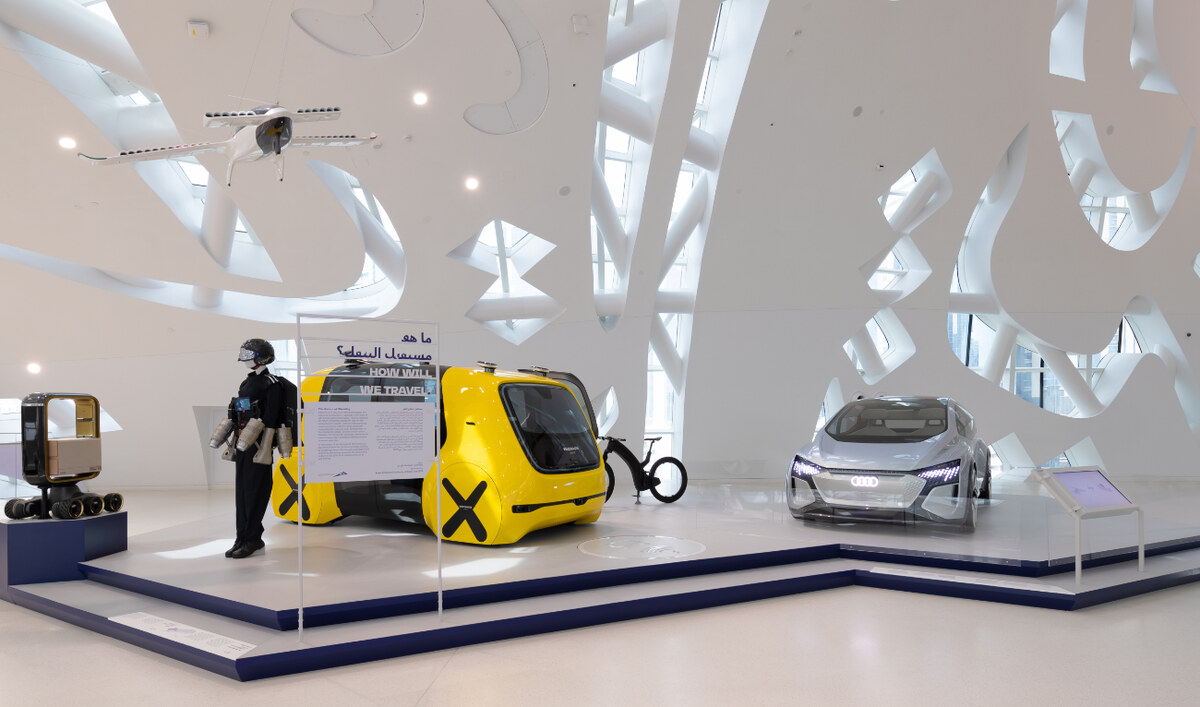DUBAI: As the third edition of the Dubai Future Forum kicks off, the UAE’s commercial capital is once again playing host to futurists, visionaries, and thought leaders from across the globe. This year’s event, being held at the city’s iconic Museum of the Future, is expected to draw over 2,500 experts, policymakers and innovators from around 100 countries.
Organized by the Dubai Future Foundation (DFF), the two-day event will feature 150 speakers across 70 sessions, making it the world’s largest gathering dedicated to futurism and foresight.
The agenda for the 2024 edition, entitled “Empowering Generations,” reflects Dubai’s vision to remain at the forefront of global futurism. The discussions will range from harnessing AI and technology for societal good to tackling the challenges of sustainability and human well-being.

The event is the world’s largest gathering dedicated to futurism and foresight. (AN Photo)
Speaking exclusively to Arab News, Khalfan Juma Belhoul, CEO of the DFF, emphasized the forum’s role in positioning Dubai as a leader in future foresight.
“Each year the event differs from the one before. The Dubai Future Forum is an anchor which positions us as leaders in foresight,” he said. “We like to promote the DFF as the headquarters of the future in the world; and in order for us to have a view on the future, we need to convene and listen to everyone.”
Held under the patronage of Sheikh Hamdan bin Mohammed bin Rashid Al-Maktoum, crown prince of Dubai and chairman of the DFF, the annual event aims to explore transformative shifts and identify practical solutions to ensure a better, sustainable future. Now in its third year, the forum continues to evolve.
Belhoul explained that the forum was born out of a vision of UAE Prime Minister and Ruler of Dubai Sheikh Mohammed bin Rashid Al-Maktoum to institutionalize foresight as a key strategy. According to him, when Sheikh Mohammed initially decided that the country needed to institutionalize foresight — something that had not been done before — it was obvious that the first thing that was needed was to find a way to convene a class of people that understood the vision.
FASTFACTS
- Event Dates: Nov. 19-20, 2024.
- Participants: 2,500 attendees, 150 speakers, 70 sessions.
- Key Topics: AI, sustainability, health, longevity, digital economy.
- Special Guests: Dr. Makoto Suzuki, Amy Webb, Sara Sabry, Paul Saffo, Jordan Nguyen.
“Fast forward to this year, we are talking about the gathering of roughly 2,500 people, 150 speakers, and 70 sessions. The numbers are steadily increasing every year,” Belhoul said. “It makes us proud to host and listen to futurist experts, especially when they speak so fondly about the DFF. We cannot claim to own a view on the future without being inclusive, collaborative, and hearing everyone.”
Conversations at the 2024 edition of the Dubai Future Forum will center on five key themes: Foresight Insights, Transforming Humanity, Optimizing Health, Empowering Generations, and Futuring Nature. The topics align with global priorities, echoing the recent UN Summit of the Future, which focused on forging an international consensus for a better present and future.
Belhoul highlighted the significance of exploring critical topics such as artificial intelligence, sustainability and societal well-being. While themes like AI and Gen AI will be on the agenda, participants will also be actively discussing how they affect communities, nature and job sectors. “If you really focus on what matters to humans, then you realize all of the above are integral components of our conversations,” he said.

Key topics to be discussed at the event include AI, sustainability, health, longevity, and digital economy. (Supplied)
“Of course, we will also be diving deeply into foresight conversations which you can consider as main pillar alongside the other themes.
“They are integral parts of our conversations and they are integral parts of what matters to humans. We are trying to create a network of like-minded people who can talk about how foresight can be done.”
The event’s focus extends to health and longevity, exploring how technological advancements can improve human well-being. As Belhoul put it, “We have to strike the balance between leveraging technology — which we haven’t yet scratched the surface of, in terms of AI and computing — and ensuring the health and well-being of our people.”
On attendance will be star-studded lineup of global experts and futurists, including the technology forecaster Paul Saffo; Jordan Nguyen, an advocate for technology-driven human enhancement; Amy Webb, CEO of the Future Today Institute; and Sara Sabry, the first female Arab and African astronaut.
One of the most eagerly anticipated speakers is Dr. Makoto Suzuki, who will share his pioneering research on the secrets of longevity.

Conversations at the 2024 edition of the Dubai Future Forum will center on five key themes: Foresight Insights, Transforming Humanity, Optimizing Health, Empowering Generations, and Futuring Nature. (Supplied)
“There is a massive line up that I am looking forward to. Anad while I will not be able to attend all the sessions, I will be listening to them as I am running on my treadmill in the morning,” Belhoul said.
He also expressed excitement about the diversity of speakers, noting how their insights will contribute to the forum’s goal of fostering global collaboration. “While some topics are AI focused, we have people like Nguyen and Webb, who are amazing story tellers. And when you have that kind of style, you attract the audience to listen to you and engage more.”
Belhoul added: “We are trying to create a network of like-minded people who can discuss how foresight can be done. It’s amazing how like-minded we are in the foresight perspective. This validates the importance of working with different networks to create a better future.”
“And how we, as humanity, can overcome the biggest challenges we might face by collectively finding ways to solve big those issues — whether its regulations for AI, solutions for climate crises, or the economic conflicts around the world.”

Khalfan Belhoul, CEO of Dubai Future Foundation. (Supplied)
The first day of the forum will include a series of keynote addresses and thematic panels, with sessions like “From Deep Space to Deep Ocean: A Future of Exploration and Discovery” and “Concepts of Time: How Do They Shape Our Future?” Innovative exchanges in intimate settings will cover everything from deep-sea robotics to the impact of science fiction on future imaginings.
Central to the event will be exploring how foresight can lead to practical solutions for pressing global challenges. Mohammad Abdullah Al-Gergawi, UAE minister of cabinet affairs and managing director of DFF, described the Dubai Future Forum as a crucial platform for fostering international cooperation.
“Rapid transformations in technology, society, and the environment make it essential to continuously revisit our government’s priorities for future readiness,” he said.

The annual event aims to explore transformative shifts and identify practical solutions to ensure a better, sustainable future. (Supplied)
One of the new initiatives at this year’s forum is the “Dubai Future Solutions — Prototypes for Humanity” exhibition, showcasing 100 cutting-edge prototypes designed to address global challenges.
Belhoul underscored the importance of listening to diverse voices and collaborating to shape the future. “We need to find a way to work in harmony when it comes to the digital economy,” he said. “By listening to opinions from all over the world, you get a boost of knowledge as to where the future is headed.”
Reflecting on the forum’s impact, he said: “The DFF is a tool for us to come up with an action plan for the future. By being inclusive and collaborative, we aim to build a world that’s ready for whatever comes next.”





























